 [Photos by Victoria Schofield]
[Photos by Victoria Schofield]
As the polls for India’s general elections closed on 19 May, and the country’s one billion inhabitants wait for the results to be announced on 23 May, the outcome in Jammu and Kashmir remains uncertain. This is not surprising given the thirty-year period of political unrest in the state which, following the breakdown of the PDP-BJP coalition in the state’s legislative assembly in 2018, is now under Governor’s rule. What is clear, however, is that, despite posters throughout the state encouraging people to ‘Cast your Vote As it Counts’, as reported in one local newspaper, the turnout has mostly been ‘dismal’.
In a state where there is such a high degree of alienation against the BJP government of Prime Minister Narendra Modi, the turnout is also an indicator of where the disaffection lies. Ladakh with its miniscule population of 274,000 (and a recorded 174,618 voters) reported a 68% turnout. In Jammu, which has a majority Hindu population, voting was also enthusiastic. In the whole of the Valley of Kashmir, voter turnout has been recorded as 22.5% which signifies a decline from its 2014 turnout of 31.18%.
The degree of turnout has also varied depending on political ideology, the separatist All Parties Hurriyat Conference (APHC) having stated, as a central tenet of its resistance to the state’s status as part of the Indian Union, that it will boycott elections. Disillusion with the political leadership is also a contributing factor. “The parties come to power by default”, said Nisar Ali, former dean of social sciences at the University of Kashmir, as reported by Shaswati Das in Livemint.
With the separatists remaining on the sidelines, four parties are in the running to occupy the six seats allotted to Jammu and Kashmir in India’s Lok Sabha: the Jammu and Kashmir Peoples Democratic Party (JKPDP), led by former Chief Minister, Mehmooba Mufti, the National Conference (NC), founded by Sheikh Abdullah and now under the leadership of his grandson, Omar Abdullah (also a former Chief Minister), the Indian National Congress (INC) and the BJP which, in the 2014 general election won three seats, the other three won by the PDP.
Like other states in India polling has taken place in phases, the earlier phases in Baramulla in northern Kashmir witnessing a 35% turnout, while Srinagar’s turnout was recorded as approximately 14%. In the second phase, Kulgam district recorded just 10.3% while Anantnag recorded 13.63% in the first phase. In Shopian and Pulwama – where the centre of the ongoing militancy has shifted – only 2.81% voted, commentators pointing out that the recent killing of three militants and the arrest of several young Kashmiris may have accounted for the lower turnout. Security was also a factor as well as the long distances people had to travel to get to the polling stations. Those who did turn out came for a reason. “We have come out to vote for safeguarding the special status of the state. We want a representative who can defend our past to give us a better future,” Abdul Hamid Manhas, a resident of Manloo village in Shopian of southern Kashmir, informed the Economic Times of India.
The issue of the state of Jammu and Kashmir’s ‘special status’ accorded by Article 370 of the Indian Constitution (outlining the terms under which the state became part of the Indian Union in 1947) remains highly contentious. In order to integrate the state fully into the Indian Union, the BJP’s longstanding objective has been to revoke Article 370. The further suggestion that Article 35A, permitting the Jammu and Kashmir legislature to define who is a permanent resident and who therefore can purchase land (enshrining the 1927 ‘hereditary state subject order’) be abrogated, is also explosive. “If that happens, it will be disastrous for Kashmir”, said a Srinagar-based journalist.
The voter turnout of the Lok Sabha elections may also provide a litmus test for the elections for the 87 seats in Jammu and Kashmir’s legislative assembly scheduled for September/October this year. ‘Political leaders have not fulfilled public expectations,’ continues Nisar Ali. ‘Unless you have full people’s participation, you cannot test democracy.’
Victoria Schofield is the Chair of the Editorial Board of the Round Table.
Related stories:
A day in the life of India’s elections – Rajasthan
Indians set to judge the Modi years in greatest democratic show on earth
Fierce poll battles await India
India online: How social media will impact the 2019 Indian General Election



